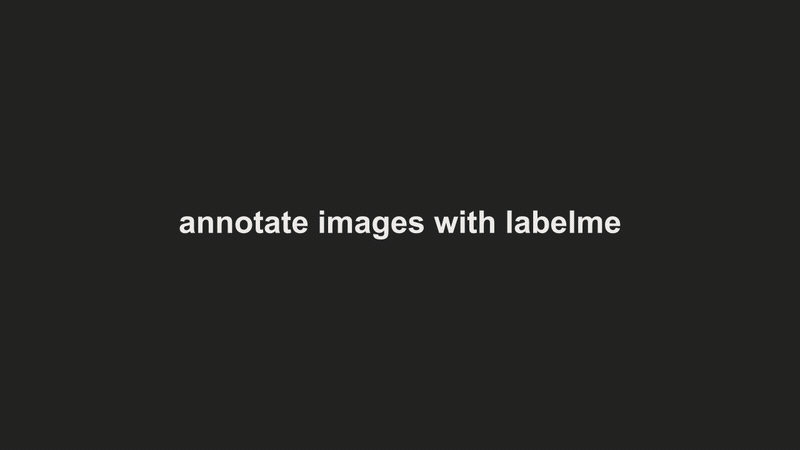%global _empty_manifest_terminate_build 0
Name: python-labelme2coco
Version: 0.2.4
Release: 1
Summary: Convert labelme annotations into coco format in one step
License: MIT License
URL: https://github.com/fcakyon/labelme2coco
Source0: https://mirrors.nju.edu.cn/pypi/web/packages/ad/ee/d2b7186eeb04007794edf49f3105ce3e128add0cb9cbf0ebeb42638fd614/labelme2coco-0.2.4.tar.gz
BuildArch: noarch
Requires: python3-sahi
Requires: python3-jsonschema
%description
## Convert LabelMe annotations to COCO format in one step
[labelme](https://github.com/wkentaro/labelme) is a widely used is a graphical image annotation tool that supports classification, segmentation, instance segmentation and object detection formats.
However, widely used frameworks/models such as Yolact/Solo, Detectron, MMDetection etc. requires COCO formatted annotations.
You can use this package to convert labelme annotations to COCO format.
## Getting started
### Installation
```
pip install -U labelme2coco
```
### Basic Usage
```python
labelme2coco path/to/labelme/dir
```
```python
labelme2coco path/to/labelme/dir --train_split_rate 0.85
```
### Advanced Usage
```python
# import package
import labelme2coco
# set directory that contains labelme annotations and image files
labelme_folder = "tests/data/labelme_annot"
# set export dir
export_dir = "tests/data/"
# set train split rate
train_split_rate = 0.85
# convert labelme annotations to coco
labelme2coco.convert(labelme_folder, export_dir, train_split_rate)
```
```python
# import functions
from labelme2coco import get_coco_from_labelme_folder, save_json
# set labelme training data directory
labelme_train_folder = "tests/data/labelme_annot"
# set labelme validation data directory
labelme_val_folder = "tests/data/labelme_annot"
# set path for coco json to be saved
export_dir = "tests/data/"
# create train coco object
train_coco = get_coco_from_labelme_folder(labelme_train_folder)
# export train coco json
save_json(train_coco.json, export_dir+"train.json")
# create val coco object
val_coco = get_coco_from_labelme_folder(labelme_val_folder, coco_category_list=train_coco.json_categories)
# export val coco json
save_json(val_coco.json, export_dir+"val.json")
```
%package -n python3-labelme2coco
Summary: Convert labelme annotations into coco format in one step
Provides: python-labelme2coco
BuildRequires: python3-devel
BuildRequires: python3-setuptools
BuildRequires: python3-pip
%description -n python3-labelme2coco
## Convert LabelMe annotations to COCO format in one step
[labelme](https://github.com/wkentaro/labelme) is a widely used is a graphical image annotation tool that supports classification, segmentation, instance segmentation and object detection formats.
However, widely used frameworks/models such as Yolact/Solo, Detectron, MMDetection etc. requires COCO formatted annotations.
You can use this package to convert labelme annotations to COCO format.
## Getting started
### Installation
```
pip install -U labelme2coco
```
### Basic Usage
```python
labelme2coco path/to/labelme/dir
```
```python
labelme2coco path/to/labelme/dir --train_split_rate 0.85
```
### Advanced Usage
```python
# import package
import labelme2coco
# set directory that contains labelme annotations and image files
labelme_folder = "tests/data/labelme_annot"
# set export dir
export_dir = "tests/data/"
# set train split rate
train_split_rate = 0.85
# convert labelme annotations to coco
labelme2coco.convert(labelme_folder, export_dir, train_split_rate)
```
```python
# import functions
from labelme2coco import get_coco_from_labelme_folder, save_json
# set labelme training data directory
labelme_train_folder = "tests/data/labelme_annot"
# set labelme validation data directory
labelme_val_folder = "tests/data/labelme_annot"
# set path for coco json to be saved
export_dir = "tests/data/"
# create train coco object
train_coco = get_coco_from_labelme_folder(labelme_train_folder)
# export train coco json
save_json(train_coco.json, export_dir+"train.json")
# create val coco object
val_coco = get_coco_from_labelme_folder(labelme_val_folder, coco_category_list=train_coco.json_categories)
# export val coco json
save_json(val_coco.json, export_dir+"val.json")
```
%package help
Summary: Development documents and examples for labelme2coco
Provides: python3-labelme2coco-doc
%description help
## Convert LabelMe annotations to COCO format in one step
[labelme](https://github.com/wkentaro/labelme) is a widely used is a graphical image annotation tool that supports classification, segmentation, instance segmentation and object detection formats.
However, widely used frameworks/models such as Yolact/Solo, Detectron, MMDetection etc. requires COCO formatted annotations.
You can use this package to convert labelme annotations to COCO format.
## Getting started
### Installation
```
pip install -U labelme2coco
```
### Basic Usage
```python
labelme2coco path/to/labelme/dir
```
```python
labelme2coco path/to/labelme/dir --train_split_rate 0.85
```
### Advanced Usage
```python
# import package
import labelme2coco
# set directory that contains labelme annotations and image files
labelme_folder = "tests/data/labelme_annot"
# set export dir
export_dir = "tests/data/"
# set train split rate
train_split_rate = 0.85
# convert labelme annotations to coco
labelme2coco.convert(labelme_folder, export_dir, train_split_rate)
```
```python
# import functions
from labelme2coco import get_coco_from_labelme_folder, save_json
# set labelme training data directory
labelme_train_folder = "tests/data/labelme_annot"
# set labelme validation data directory
labelme_val_folder = "tests/data/labelme_annot"
# set path for coco json to be saved
export_dir = "tests/data/"
# create train coco object
train_coco = get_coco_from_labelme_folder(labelme_train_folder)
# export train coco json
save_json(train_coco.json, export_dir+"train.json")
# create val coco object
val_coco = get_coco_from_labelme_folder(labelme_val_folder, coco_category_list=train_coco.json_categories)
# export val coco json
save_json(val_coco.json, export_dir+"val.json")
```
%prep
%autosetup -n labelme2coco-0.2.4
%build
%py3_build
%install
%py3_install
install -d -m755 %{buildroot}/%{_pkgdocdir}
if [ -d doc ]; then cp -arf doc %{buildroot}/%{_pkgdocdir}; fi
if [ -d docs ]; then cp -arf docs %{buildroot}/%{_pkgdocdir}; fi
if [ -d example ]; then cp -arf example %{buildroot}/%{_pkgdocdir}; fi
if [ -d examples ]; then cp -arf examples %{buildroot}/%{_pkgdocdir}; fi
pushd %{buildroot}
if [ -d usr/lib ]; then
find usr/lib -type f -printf "/%h/%f\n" >> filelist.lst
fi
if [ -d usr/lib64 ]; then
find usr/lib64 -type f -printf "/%h/%f\n" >> filelist.lst
fi
if [ -d usr/bin ]; then
find usr/bin -type f -printf "/%h/%f\n" >> filelist.lst
fi
if [ -d usr/sbin ]; then
find usr/sbin -type f -printf "/%h/%f\n" >> filelist.lst
fi
touch doclist.lst
if [ -d usr/share/man ]; then
find usr/share/man -type f -printf "/%h/%f.gz\n" >> doclist.lst
fi
popd
mv %{buildroot}/filelist.lst .
mv %{buildroot}/doclist.lst .
%files -n python3-labelme2coco -f filelist.lst
%dir %{python3_sitelib}/*
%files help -f doclist.lst
%{_docdir}/*
%changelog
* Fri May 05 2023 Python_Bot - 0.2.4-1
- Package Spec generated






